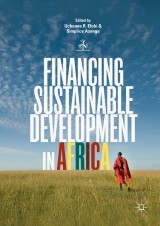Details

Financing Sustainable Development in Africa
|
106,99 € |
|
| Verlag: | Palgrave Macmillan |
| Format: | |
| Veröffentl.: | 15.05.2018 |
| ISBN/EAN: | 9783319788432 |
| Sprache: | englisch |
Dieses eBook enthält ein Wasserzeichen.
Beschreibungen
This edited volume provides a critical evaluation of financing options for sustainable development in Africa. While sustainability has long been the watchword for development programs, and while many African countries have taken initiatives to develop integrated frameworks that tackle developmental challenges—including poverty, education, and health—financing has remained a challenge. In this book, an expert team of chapter authors examines new financing options while also exploring how traditional financing means, such as foreign aid and foreign direct investment, can be more effective for sustainability. The authors discuss how African nations can build adequate structures and productive capacity to create a platform that can meet present economic, social, and environmental needs without compromising the ability of future generations to meet their own needs. Practical case studies and scientific evidence give this book a unique approach that is both qualitative and quantitative. Thisbook will be of interest to students, practitioners, and scholars of development studies, public policy and African economics.
<div><div>1. Introduction.- 2. Financing Mechanisms African Governments Should Pursue in Financing Sustainable Development in the Next 20 Years.- 3. Financial Inclusion and Foreign Market Participation of Firms: A Quasi-experiment from Nigeria.- 4. Business Regulations and Foreign Direct Investment in Sub-Saharan Africa: Implications for Regulatory Reform.- 5. Broadening Financial Intermediation in Sub-Saharan Africa.- 6. Institutions, Fiscal Performance, and Development Trajectories in ECOWAS: Implications for Sustainability.- 7. Capital Flows and Economic Growth: Does the Role of State Fragility Really Matter for Sustainability?.- 8. Changing Patterns of the Official Development Assistance to Sub-Saharan Africa.- 9. Financing Sustainable Energy Access with Oil Revenues in Sub-Saharan Africa: Trends and Strategies.- 10. Maximizing the Gains from Natural Resources.- 11. Does the Implementation of Social Safety Net Intervention Affect Indigenous Social Capital Systems for Coping with Livelihood Shocks? Ethnographic Evidence of Agro-Pastoral Communities in Eastern Ethiopia.- 12. Issues in Sustainable Development: The Environment-Income Relationship.- 13. Micro-credit, Child Education, and Health Outcomes: A Case Study from Ghana.- 14. Financial Inclusion and Growth of Non-Farm Enterprises in Ghana.- 15. The Role of Co-operative Organizations in Tanzania’s Industrialization.- 16. The Textiles and Clothing Sector and the Industrialization of Sub-Saharan Africa. </div><div><br></div></div>
<div><div>Efobi Uchenna is Faculty at the College of Business and Social Sciences, Covenant University, Nigeria. He is also a Hewlett Scholar and an Alumnus of the Brown International Advanced Research Institutes. His research interests include household decision making dynamics and development outcomes; rural institution and agricultural productivity; and governance, with a special focus on the African region. </div><div><br></div><div>Asongu Simplice is the Lead Economist and Director of the African Governance and Development Institute, and a Visiting Professor at the University of Cape Town, South Africa. He is also a Research Associate at Oxford Brookes University, UK; Covenant University, Nigeria; and the University of Buea, Cameroon. </div></div>
This edited volume provides a critical evaluation of financing options for sustainable development in Africa. While sustainability has long been the watchword for development programs, and while many African countries have taken initiatives to develop integrated frameworks that tackle developmental challenges—including poverty, education, and health—financing has remained a challenge. In this book, an expert team of chapter authors examines new financing options while also exploring how traditional financing means, such as foreign aid and foreign direct investment, can be more effective for sustainability. The authors discuss how African nations can build adequate structures and productive capacity to create a platform that can meet present economic, social, and environmental needs without compromising the ability of future generations to meet their own needs. Practical case studies and scientific evidence give this book a unique approach that is both qualitative and quantitative. Thisbook will be of interest to students, practitioners, and scholars of development studies, public policy and African economics.
Includes a number of case studies to analyze of specific financing options in African countries Provides empirical insights on development, considering both foreign and domestic finance flows Discusses financing options that have worked in a selection of African countries and explores how these can be replicated in other countries
<br>
Diese Produkte könnten Sie auch interessieren:

Integration, Growth, and Cohesion in an Enlarged European Union

von: John Bradley, George G. Petrakos, Julia Traistaru

149,79 €

Rethinking Regional Innovation and Change: Path Dependency or Regional Breakthrough

von: Gerhard Fuchs, Philip Shapira

149,79 €














